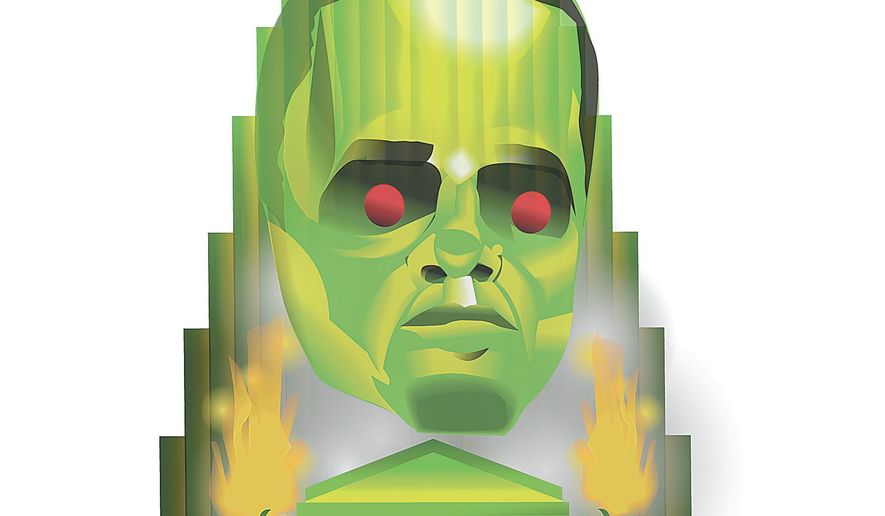OPINION:
President Obama returned from his full-time job as the Democratic Party’s fundraiser-in-chief to host today’s U.S.-Africa Leaders Summit. As he winged his way back to Washington from Kansas City aboard Air Force One, the president sat for an interview with editors of The Economist.
The interview was pure Barack Obama, and it revealed him for what he is — an intellectually agile partisan fantasist. According to Mr. Obama, there really haven’t been that many problems, but those we may be experiencing are the fault not of his policies or leadership, but of the fact that he continues to have to contend with dysfunctional, partisan opposition.
According to the president, he’s done a great job both at home and abroad. We’ve got the international balance about right, he suggests, neglecting to mention the glitches we’ve encountered in Ukraine, the Middle East or the South China Sea, and his domestic initiatives have proven remarkably successful. The economy is doing better than anyone might have expected, given the mess he inherited and everyone should be happy except perhaps corporate types, who consider complaining about overregulation and the like part of their jobs.
He brags about the “52 consecutive months of job creation” ushered in by his election, takes credit for the energy boom and suggests to his interviewers that “I think you’d have to say that we’ve managed the economy pretty well.”
Consider this self-assessment. “Since I have come into office, there’s almost no economic metric by which you couldn’t say that the U.S. economy is better and that corporate bottom lines are better. None.” This is a president who must look exclusively to Paul Krugman and the folks at MSNBC for economic facts and analysis.
Mr. Obama does make some small concessions. He might have managed to construct a more “elegant” health care plan, but for the give-and-take dictated by our politics, and if “nativist” Republicans hadn’t blocked him, we’d have the immigration reform American business needs. He even has a little praise for those otherwise black-hatted business types who keep harping about being overregulated and taxed: They are with him on immigration reform because they need new workers.
He argues that he is a great believer in trade and development while Republicans are protectionist and “antiglobalization” by equating opposition to the crony capitalism of the Export-Import Bank with hostility to free trade. Joel Gehrke at National Review Online nails Mr. Obama on this one: “Obama equates globalization with free trade” and “regards opposition to Ex-Im as protectionist.”
Mr. Gehrke writes, “The president doesn’t seem to understand that it’s ’free’ because the government isn’t interfering with it. Or maybe he thinks it’s ’free’ because the government is helping the business make a deal, rather than imposing a rule that explicitly impedes trade. (In short, he thinks that being pro-business is the same as being pro-free market — something he rarely states so explicitly, given his preference for accusing Republicans of trying to ’rig the system for those at the top.’)”
There is no question that the Obama administration has used its power to promote some businesses. But stimulus money, grants and contracts to favored corporations, deals with companies headed by campaign bundlers and help for businesses promoting proven or unproven technologies in favor at the White House are not evidence of a dedication to a free market. They are proof, instead, of a quintessential crony capitalist mentality that favors the president’s friends over everybody else. That may be “good” politics in the short run or for a politician who is not running for office ever again, but it’s very bad economics.
Gone is the new Asian focus. The president says he’s now focused on Africa, perhaps because there seems little more he can do to improve things in the Middle East, Ukraine or even the South China Sea. He’s hoping to fare better in helping African development while suggesting that we don’t want to be too involved because not everyone welcomes us and because, realistically, some African countries can, as long as they’re careful, to look to China for help. He cavalierly dismisses any concerns about the increasing influence of Beijing with the flip “the more the merrier.”
While the president seems completely unconcerned about the costs of immigration to this country, he is worried that other nations ought to watch their borders lest they be inundated with unwanted and presumably undocumented immigrants whose presence could impede their economic development.
This, he says, is why he is concerned, for example, about how Zimbabwe’s failure to play a more active role within Africa will hurt the Zimbabwean economy and people. “As a key regional power, if they fail to invest in the kind of international order or regional order that helps ordinary Zimbabweans thrive, then they’re going to have an immigration problem — which they already do. That, in turn, is going to put pressure on them and their economies. And ultimately, those chickens will come home to roost.”
He should know.
David A. Keene is opinion editor of The Washington Times.




Please read our comment policy before commenting.